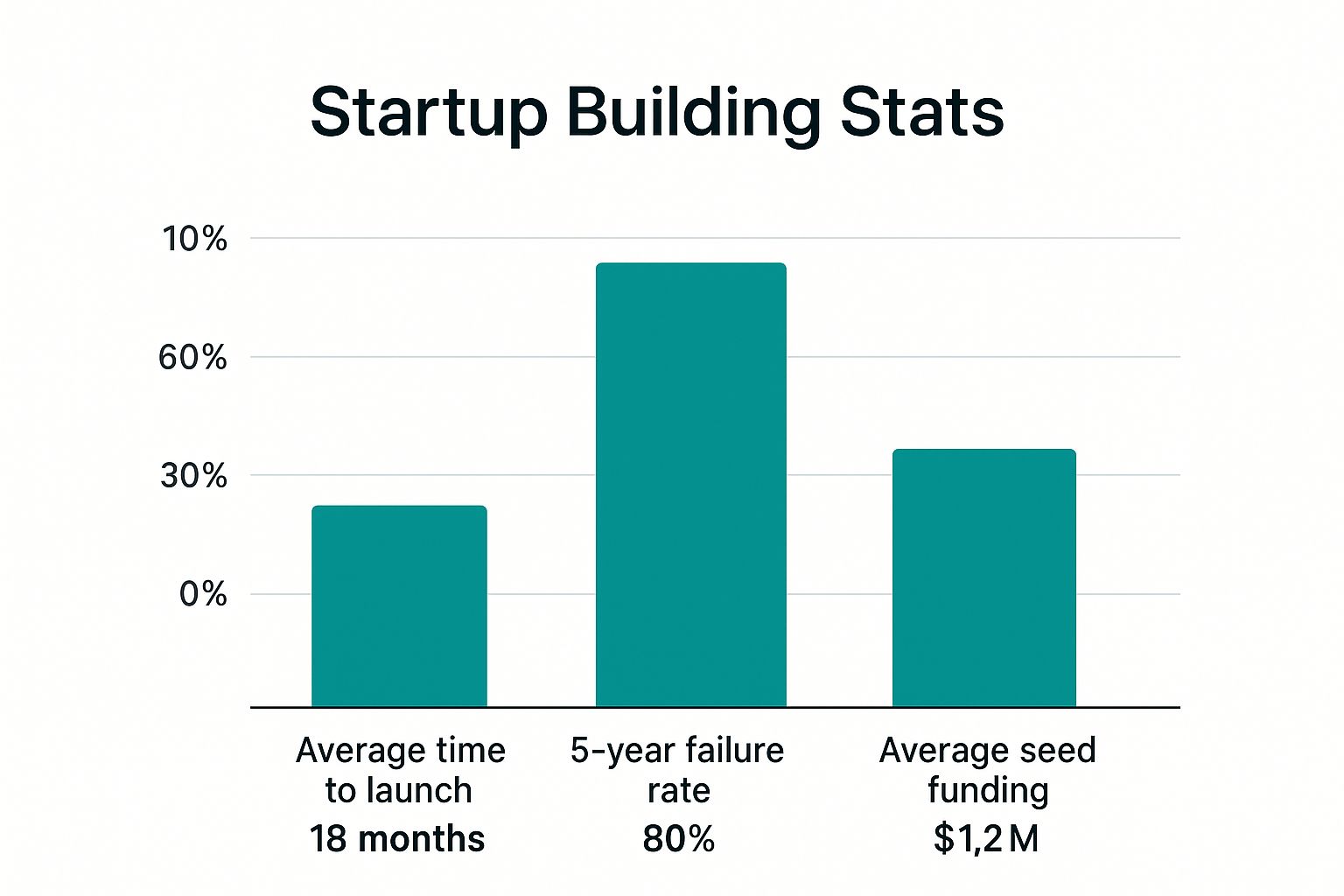Navigating The Startup Building Landscape Today

The startup world is constantly evolving. Today's founders face a unique mix of challenges and opportunities. Understanding the current market is key to building a successful and resilient business. The data chart above visualizes the global startup investment distribution across different regions and sectors. As you can see, Asia attracts significant investment, highlighting its growing influence in the global startup scene.
Regional Disparities and Shifting Valuations
The global startup scene has gone through a major reset. Some regions are facing difficulties, while others are booming. This highlights the importance of being adaptable and understanding the specific characteristics of each region.
For example, North American and European tech hubs have seen fewer IPOs and exits. Meanwhile, Asian markets are thriving. This difference in growth is mainly due to funding patterns and government support.
Large Series C+ funding rounds, often over $500 million, are driving growth in Asian ecosystems like Seoul and Bangalore. Government-backed accelerator programs also give crucial support to early-stage startups in these areas. This is a stark contrast to the funding struggles of many Western startups.
The 2025 Global Startup Ecosystem Report shows a 15-20% decline in the total global startup ecosystem value compared to 2024. This is the first contraction in five years, after a decade of growth. Learn more at Startup Genome.
To illustrate these regional shifts, let's take a look at the following table:
Global Startup Ecosystem Value Comparison
This table compares the valuation and performance metrics of major startup ecosystems across different regions.
| Ecosystem |
2024 Valuation (USD Billions) |
2025 Valuation (USD Billions) |
% Change |
Key Sectors |
| North America |
250 |
200 |
-20% |
Tech, Healthcare |
| Europe |
175 |
140 |
-20% |
Fintech, Sustainability |
| Asia |
200 |
240 |
+20% |
AI, E-commerce |
As the table clearly demonstrates, Asian startup ecosystems experienced significant growth, while North American and European ecosystems contracted. This shift highlights the increasing importance of Asian markets in the global startup landscape.
The Rise of AI and its Impact on The Startup Building
Even with the global downturn, one area is attracting lots of attention: Artificial Intelligence. The report shows that AI startups are getting 30% of all venture capital. This shows how much potential AI has to change different industries and create value. However, the report also points out that successful exits in the AI sector are still rare because large companies often control commercialization.
The New Funding Reality in The Startup Building Process

The startup funding landscape has changed dramatically. The era of easy money and aggressive growth is over. Today's investors are more cautious, demanding a new approach to building a startup. This new approach prioritizes capital efficiency and sustainable growth.
From Growth at All Costs to Capital Efficiency
The days of abundant funding rounds are fading. Founders now need a strategic, measured approach to their finances. Focusing on key performance indicators (KPIs) that demonstrate profitability and long-term viability is essential.
This shift requires a new pitch narrative. Investors want to see sustainable businesses, not just rapid growth. Founders must demonstrate strong unit economics, clear paths to profitability, and a deep understanding of their target market. Careful management of burn rate and runway is also critical.
The focus has shifted to capital-efficient models. Investors are looking for startups that can achieve sustainable growth with controlled spending. This represents a significant departure from the previous "growth at all costs" mentality.
Global venture funding trends reflect this change. In Q1 2025, global venture funding reached $74 billion, a modest 5% year-over-year increase. This followed a challenging 2024, where funding decreased by 35% compared to 2021's peak of $643 billion. Early-stage deals now comprise 60% of transactions, while mega-rounds ($100M+) have dropped to their lowest level since 2018. Learn more about this trend and what it means for founders in this detailed analysis of Global Startup Funding.
To help understand the current funding distribution, let's look at the following table:
Venture Funding Distribution by Startup Stage
This table shows how venture capital is currently distributed across different startup stages and what this means for founders.
| Funding Stage |
Percentage of Deals |
Average Deal Size |
YoY Change |
Key Requirements |
| Pre-Seed |
25% |
$1M |
+5% |
Strong team, innovative idea, initial traction |
| Seed |
35% |
$5M |
-2% |
Product-market fit, growing user base, clear revenue model |
| Series A |
20% |
$15M |
+10% |
Scalable business model, strong leadership team, proven market traction |
| Series B |
10% |
$50M |
-5% |
Rapid growth, market expansion, strong financials |
| Series C+ |
10% |
$100M+ |
+2% |
Dominant market share, profitability, preparation for IPO |
This data highlights the increasing focus on early-stage funding. While later-stage rounds are still happening, securing seed and Series A funding is now more critical than ever. This requires founders to demonstrate strong fundamentals and a clear path to profitability early on.
Sector Focus and Investor Priorities
While funding is tighter overall, some sectors remain attractive to investors. Climate tech and AI infrastructure have captured 45% of total funding in recent periods, reflecting their importance in addressing global challenges and driving technological advancement.
Building for Funding Success in the New Reality
Founders need to adapt their strategies to succeed in this new environment. This includes building leaner teams, focusing on essential product features, and prioritizing early revenue generation.
Here are key strategies for securing funding in the current climate:
- Demonstrate Capital Efficiency: Show how you achieve milestones with limited resources.
- Focus on Profitability: Highlight clear paths to profitability and sustainable revenue.
- Target Early-Stage Funding: Prioritize seed and Series A funding.
- Craft a Compelling Narrative: Tell a story that resonates with investor priorities, focusing on long-term value.
By embracing these strategies, founders can position their startups for success. This focus on building sustainable and resilient businesses will ultimately create stronger, more valuable companies. For solo founders navigating these challenges, platforms like IndieMerger can help find a co-founder to strengthen their venture.
Building Resilience: What Failure Teaches About Success
The startup journey is often glamorized, with tales of instant riches and billion-dollar valuations. The truth, however, is far less glamorous and significantly more demanding. Building a thriving startup requires resilience, adaptability, and a keen understanding of the common pitfalls that lead to failure.
Understanding the Startup Failure Landscape
The reality of startups is harsh. A significant 20% of new ventures fail within the first year, and that number climbs to a staggering 65% by year five. This underscores the inherent difficulties in launching and scaling a new business. It's important to recognize, though, that the definition of "failure" is changing. Many startup closures now represent strategic pivots or acquisitions rather than complete collapses. This points to a shift towards adaptation and iteration, rather than simply giving up. The startup landscape remains challenging. According to 2025 analyses, 20% of new ventures fail within their first year, and that number increases to 65% by year five. However, the definition of "failure" is evolving. Many closures now represent strategic pivots rather than bankruptcies. Unicorn creation reached a 7-year low in 2024 with only 120 new companies valued at $1 billion or more, a significant drop from 2021's record of 536. Survival rates also vary geographically. 75% of Y Combinator graduates are still operating after five years, compared to 35% for non-accelerated startups. Furthermore, corporate venture capital now represents 28% of all early-stage deals, significantly shifting funding dynamics. For a deeper dive into these statistics, check out this insightful resource: Startup Statistics.
This data illustrates the crucial support that accelerators provide and highlights the growing influence of corporate investors in the startup ecosystem. These resources can drastically improve a startup's likelihood of success.
Learning From Failure: Pivoting and Iterating
Failure, while often painful, can be an invaluable learning experience. Understanding the reasons behind startup failures at different stages is key to building resilience. Some common culprits include:
Lack of Product-Market Fit: Developing a product that doesn't address a genuine need for a specific target market.
Running Out of Cash: Poor financial management and difficulty securing subsequent funding.
Team Issues: Conflicts within the founding team or struggles to attract and retain talent.
Poor Marketing and Sales: Ineffectively reaching and converting potential customers.
Successfully overcoming these obstacles often requires pivoting – adapting your business model, target market, or product offering based on market feedback and insights. This ability to adapt and iterate is a key characteristic of resilient startups. For solo founders facing these challenges, finding the right co-founder through platforms like IndieMerger can provide vital expertise and support during critical pivots.
Building Resilience in Your Startup
Resilience isn't about avoiding failure altogether; it's about preparing for it. Here are some key strategies to build resilience into your startup from the outset:
Validate Your Idea Early: Comprehensive market research and customer discovery can significantly reduce the risk of developing a product that nobody wants.
Build a Strong Team: A cohesive and skilled team is essential for navigating challenges and adapting to changing market conditions.
Develop a Capital-Efficient Model: Prioritize maximizing your runway and achieving key milestones with minimal resources.
Establish Feedback Loops: Regularly gather feedback from customers and investors to pinpoint areas for improvement and pivot as needed.
By embracing these principles, you can enhance your startup's chances of not only surviving but thriving in the demanding world of entrepreneurship.
The Startup Building Framework That Actually Works

Moving from an initial concept to a thriving startup takes more than just a brilliant idea. It requires a robust framework to guide the entire process. This ensures that each step contributes to a sustainable and scalable business. This section explores a practical framework proven effective for numerous startups, highlighting the key elements for success.
Idea Validation and Customer Discovery
Validating your idea is paramount. This means confirming a genuine market need for your product or service. This crucial step prevents wasted resources and boosts the likelihood of long-term success. Effective customer discovery plays a vital role in this process. By directly engaging with your target audience, you gain invaluable insights into their pain points and preferences.
This direct interaction helps refine your offering to meet real market demands. For solo founders, customer discovery can be especially challenging. Connecting with a co-founder through a platform like IndieMerger can offer valuable support and diverse perspectives during this vital stage.
MVP Development and Feedback Loops
After validating your idea, the next step is developing a Minimum Viable Product (MVP). An MVP is a streamlined version of your product, featuring only the core functionalities. Its purpose is to gather user feedback quickly and iterate based on real-world data.
This rapid iteration cycle is essential for adapting to market demands and refining your product. Establishing strong feedback loops ensures continuous improvement. This involves consistently collecting and analyzing user data, then using these insights to enhance your product. This iterative approach is key to building a product that truly resonates with your target audience.
Structuring Early Operations and Resource Allocation
Successful founders prioritize efficient early operations. This includes defining clear roles and responsibilities, establishing realistic milestones, and fostering a culture of accountability. Effective resource allocation is also critical.
This means prioritizing tasks and investments that maximize learning and contribute to the core value proposition. Strategic decisions about allocating limited resources—time, money, and talent—can significantly impact your startup’s trajectory.
Adaptability and Investor Expectations
Building a startup is an ongoing journey. It requires adaptability and a willingness to adjust based on market feedback and evolving investor expectations. This flexibility is essential for long-term survival.
Understanding investor expectations is also key. By aligning your strategy with investor priorities, you increase your chances of securing funding and achieving sustainable growth.
Team Construction: The Hidden Engine of Startup Building
Every successful startup has a strong team behind it. This section explores how crucial team composition is to achieving startup success. We'll share insights from founders and investors who have seen firsthand how team dynamics influence outcomes.
Talent Acquisition in Resource-Constrained Environments
Early-stage startups often have limited resources for attracting talent. However, effective strategies can help secure high-performing individuals even on a tight budget.
Consider compensation strategies that go beyond salary. Think profit-sharing or performance-based bonuses. These incentives appeal to people motivated by ownership and ambitious goals.
For solo founders looking to expand, platforms like IndieMerger can connect them with potential co-founders with complementary skills. A well-structured equity distribution model is also vital.
This model should incentivize early team members and align their interests with the startup's long-term success. Create a system that fairly rewards contributions while preserving equity for future growth and investment.
Culture and Retention: Building a Team That Lasts
A positive and supportive company culture is essential for retaining top talent. This culture should encourage open communication, collaboration, and a shared purpose.
Achieve this through team-building activities, regular feedback, and a culture of recognition. Prioritize work-life balance and a healthy work environment to reduce burnout and make team members feel valued.
Identifying and Addressing Skill Gaps
As your startup grows, identifying and addressing skill gaps becomes increasingly important. Early on, you might need strong technical skills for product development.
Later, sales and marketing expertise might become more critical. Recognizing these shifts and proactively hiring or training for needed skills is crucial for maintaining momentum. Bringing in experienced advisors or mentors can provide guidance and support where your team lacks expertise. Solo founders can also leverage IndieMerger as a valuable resource for team building.
Navigating Co-Founder Dynamics
Co-founder relationships are vital, but navigating these dynamics, especially under pressure, can be challenging. Open communication, clearly defined roles, and a shared vision are key.
Building a framework for conflict resolution and decision-making early on can prevent disputes from hindering progress. Regular meetings to discuss challenges and ensuring each co-founder has a clear area of responsibility can help.
Building Diverse Teams for Enhanced Decision-Making
Team diversity isn’t just socially responsible; it’s a business advantage. Diverse teams bring a wider range of perspectives and experiences, which enhances decision-making.
This includes diversity in backgrounds, skills, and thought processes. It leads to more creative solutions and a better understanding of your target market. This broader perspective helps identify potential blind spots and reduce bias in product development and marketing.
By building a strong, diverse team, fostering a positive culture, and addressing skill gaps, founders can position their startups for long-term success. This creates a foundation for innovation, effective execution, and sustainable growth.
Technology Decisions That Shape The Startup Building Journey

The technology choices you make during your startup's development are critical. These decisions can significantly impact your growth trajectory, either propelling your venture forward or creating substantial obstacles. Choosing the right tech stack – the combination of programming languages, frameworks, and tools – directly affects your startup's development speed, scalability, and even how investors view your company.
Build vs. Buy: Making Strategic Choices
One of the most fundamental decisions you'll face is whether to build your technology in-house or use existing solutions. This build-vs-buy decision requires careful evaluation of your resources, timeline, and long-term objectives. Building custom solutions provides greater control and the potential for unique features, but comes with higher initial costs and longer development timelines.
Purchasing existing software can be quicker and more budget-friendly upfront, but may limit customization and flexibility later. The presence of open-source tools and platforms further complicates this decision, offering a middle ground between building and buying. For a solo founder, navigating these choices can be particularly challenging. Finding a technical co-founder through platforms like IndieMerger can significantly simplify this process and ensure your startup has a strong technical foundation.
Managing Technical Debt
As your startup expands, so will its technology needs. Managing technical debt – the implied cost of rework caused by choosing an easy solution now instead of a better, more time-consuming approach – is essential. While some technical debt is inevitable in the early stages, uncontrolled accumulation can significantly impede your progress later on.
This requires a balanced approach. Prioritize rapid development to gain early traction while still making sound architectural choices to avoid crippling technical debt in the future. This careful balance is essential for sustainable growth.
Evolving Your Architecture as You Scale
Your initial tech stack might be ideal for a prototype or Minimum Viable Product (MVP), but may not be suitable for a rapidly growing business. As your company scales, you'll need to regularly re-evaluate your technology architecture and adapt as needed. This might involve migrating to more robust platforms, adopting a microservices architecture, or implementing more sophisticated data management solutions.
The ability to adapt your technology to meet evolving business needs is crucial for long-term success. Be proactive and plan for future scalability rather than reacting to problems as they arise. Building a resilient and adaptable technical infrastructure from the outset is a key element of the startup building process.
The Future of Startup Building: Adapting to Win
The startup world is constantly changing. New trends, from the rise of Artificial Intelligence (AI) and the prevalence of remote teams to innovative funding models and market entry strategies, are reshaping how successful companies are built. This creates both exciting opportunities and significant challenges for founders.
The Impact of AI on Startup Building
AI is rapidly transforming how startups operate. While AI-focused startups attract significant investment (30% of all venture capital, according to the 2025 Global Startup Ecosystem Report), successfully exiting remains a challenge. Large corporations often dominate AI commercialization, making competition fierce. However, AI offers tremendous opportunities for startups in other sectors.
By integrating AI, startups can:
- Automate tasks: Freeing up founders to focus on strategic initiatives.
- Improve decision-making: Leveraging data analysis and predictive modeling.
- Personalize customer experiences: Tailoring products and services to individual needs.
The Rise of Distributed Teams and Remote Work
The shift toward remote work has unlocked new possibilities. Distributed teams provide access to a larger talent pool and reduce the overhead of traditional offices. This allows startups to scale efficiently and recruit top talent regardless of location.
However, managing remote teams requires clear communication strategies and a robust company culture to ensure team cohesion and productivity.
Evolving Funding Structures and Investor Expectations
The funding landscape has changed dramatically. The focus has shifted from rapid growth at any cost to capital efficiency and sustainable growth. Investors are looking for startups with:
- Strong unit economics: A clear path to profitability.
- Data-driven decision-making: Using data to guide strategy and measure results.
- Adaptable business models: The ability to adapt to changing market conditions.
Adapting to Regulatory Developments and Technological Advancements
Startups must navigate an ever-changing regulatory landscape. New laws can impact everything from data privacy to intellectual property. Staying informed and compliant is essential for long-term success.
Furthermore, continuous technological advancements require startups to remain agile. Embracing new technologies can create a competitive edge, but requires careful evaluation and strategic implementation.
Building Adaptable Operational Models and Resilient Growth Strategies
To thrive in the future of startup building, founders should prioritize:
- Flexibility: Adaptable operational models that respond to market shifts.
- Resilience: Strategies to overcome challenges and recover from setbacks.
- Continuous learning: Staying informed about trends, technologies, and best practices.
By embracing these principles, founders can position their startups for success in the evolving startup landscape. Focusing on building adaptable, resilient companies leads to stronger, more valuable ventures. For solo founders navigating these challenges, finding a co-founder with complementary skills through a platform like IndieMerger can be invaluable for building a strong team and adapting to the ever-changing demands of the startup world.